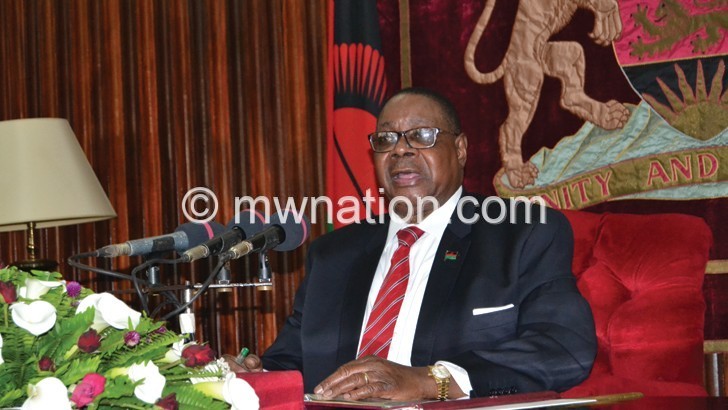Mutharika dodges media
President Peter Mutharika on Thursday October 5 2017, stayed away from a news conference on his United Nations General Assembly (Unga) trip and instead delegated a Cabinet minister and two of his aides to do the honours.
Minister of Foreign Affairs and International Cooperation Emmanuel Fabiano and State House director of communications Bright Molande accompanied by presidential press secretary Mgeme Kalilani defended the President’s departure from a long-standing tradition to update the nation through the media, arguing he is not mandated by any legal statutes to do so.

Fabiano said he was briefing the media as a follow up to another news conference he addressed before the 72nd Unga held in New York.
But his sentiments belied the presence of the State House officials, notably Molande and Kalilani who was tasked with reading out the communiqué from the Unga trip.
During the pre-trip briefing, the State House officials were not present.
Responding to a question on why the President was not addressing the media in person considering there were other pertinent issues requiring his attention such as the killing of six people in blood sucking related incidents, political violence in Nsanje and Rumphi which took place in his absence, Fabiano said the President was not dodging the media.
Said the minister: “There are other avenues for sharing that kind of information and the President does respond to questions from time to time. The President will respond to such issues at an appropriate time, but for now we are focusing on what happened at the United Nations General Assembly.”
However, Molande was not so succinct as he said the President addressing the media after an Unga NGA trip was not a must and made no promises on whether the press conference would take place.
He said: “There is that belief coming historically because there is no statutory requirement as such that the reporting that when a President goes abroad would be done in this way or that way based on circumstances from time to time.”
Molande said the President has not consistently addressed the media on arrival from an international visit and the President should be commended for being accountable and disclosing his engagements to the public.
“It is an expectation which we understand, but it is not mandatory that every time the President has travelled abroad that he must directly address the media. Most importantly, the question of addressing the other issues as media we know other avenues of engaging government to address the other national issues,” he said.
However, since the President assumed office in 2014 and attended his first Unga as Head of State, he has addressed the media to respond to issues such as a bloated delegation.
In 2016, Mutharika was quick to address a press conference following an extended stay in the US and his arrival where it was observed that he was not using his right arm entrenching fears that he had a medical problem.
Meanwhile, the government has once again defended the President’s extended stay after the assembly had closed.
Fabiano also did not clearly respond to questions on the size of the delegation or the budget.
On the budget, he said it was less than last year because the delegation was smaller but apparently forgot that the government has never disclosed the budget for Unga.
Commenting on the extended stay, Fabiano said the President could not manage to attend most of the 38 meetings at the UN within a few days.
“There were more engagements than the time available so it was cost-effective to pack in as many meetings as possible. What the government achieves from these meetings matters more than the number of days,” he said.
At the UN, the President took part in 12 high-level meetings.
Fabiano said the impact of the numerous meetings at the UN could not be assessed immediately as most were meant to initiate cooperation.





